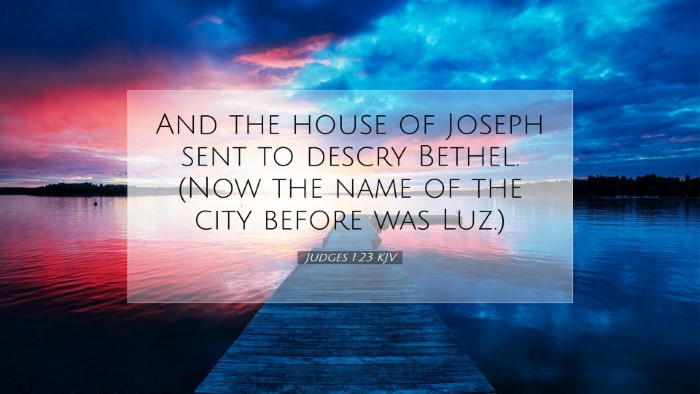Commentary on Judges 1:23
Judges 1:23 states, "And the house of Joseph sent to descry Bethel. (Now the name of the city before was Luz.)" This verse unveils a critical moment in Israel’s history, encapsulating both geography and spiritual implications in the aftermath of their conquest of Canaan.
Historical Context
This passage occurs in the early periods of the Israelite settlement in the Promised Land, a time characterized by the yet-unconsolidated nature of the tribes and their territories. Understanding the historical context of this event is essential for grasping its significance.
Significance of Bethel
- Geographical Importance: Bethel, originally known as Luz, was a key city in the territory of Ephraim. Its strategic location made it a pivotal point for control of the surrounding areas.
- Spiritual Heritage: Bethel was significant for its religious heritage, being a site of worship and a focal point for Israelite identity, particularly due to Jacob’s dream of the ladder reaching to heaven (Genesis 28:10-22).
Insights from Commentaries
Matthew Henry's Commentary
Matthew Henry emphasizes the actions of the house of Joseph in sending spies to explore Bethel. He reflects on the significance of reconnaissance in military strategy, noting that it demonstrates prudence and a methodical approach to claiming the land. Henry remarks on the importance of the unity of the tribes and their collective efforts in securing their inheritance, which reflects their reliance on God’s guidance.
Albert Barnes' Commentary
Albert Barnes provides insight into the name change from Luz to Bethel. He highlights that the name “Bethel” means “House of God,” which underscores the transformation of the area into a place of worship and divine revelation. Barnes points out that the change of name signifies a new identity for the people after their covenant with God. This reflects a deeper spiritual understanding of place, not merely as a physical territory but as a sacred space of God's presence.
Adam Clarke's Commentary
Adam Clarke focuses on the importance of the exploratory mission of the house of Joseph. He notes that the endeavor to spy out the land indicates both courage and a sense of responsibility. Clarke also mentions that this action illustrates the community’s commitment to fulfilling God’s promise of land. The mission to conquer and rename Luz to Bethel symbolizes the Israelites' faith in God’s promise and the desire to establish their identity in the land.
Theological Implications
The complexities presented in Judges 1:23 lead to significant theological discourse relevant for pastors, theologians, and scholars today.
The Nature of God’s Promises
The mention of Bethel serves as a reminder that God's promises are not only about physical land but also about spiritual heritage and identity. The Israelites were reclaiming not just territory but also the spiritual authority and heritage imbued in that land by God.
Faith and Action
The proactive steps taken by the house of Joseph reflect a key theme in scripture: the balance between divine sovereignty and human responsibility. Their willingness to send spies is an act of faith that involves trusting in God's ultimate victory while also taking necessary actions to fulfill His promises.
Unity among God’s People
Judges 1:23 underscores the necessity of unity among the tribes of Israel in their conquest. This serves as a theological principle for modern believers, emphasizing the importance of collaboration and community efforts in the mission of the church today.
Conclusion
The insights from public domain commentaries reveal profound truths embedded in the seemingly simple narrative of Judges 1:23. It calls upon today’s students of the Bible to appreciate the historical, spiritual, and theological depth that can be gleaned from this passage. Specifically, the exploration into Bethel challenges believers to consider their own identity in Christ and the importance of proactive faith amidst God’s promises.


